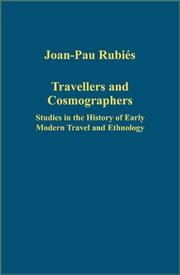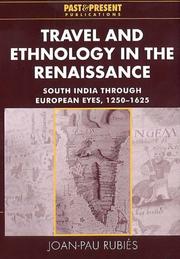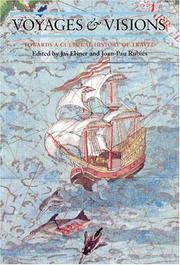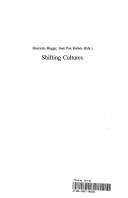| Listing 1 - 7 of 7 |
Sort by
|
Book
ISBN: 9780754659556 0754659550 9781315249292 9781351918602 Year: 2009 Publisher: Farnham Ashgate
Abstract | Keywords | Export | Availability | Bookmark
 Loading...
Loading...Choose an application
- Reference Manager
- EndNote
- RefWorks (Direct export to RefWorks)
From the twelfth century, a growing sense of cultural confidence in the Latin West (at the same time that the central lands of Islam suffered from numerous waves of conquest and devastation) was accompanied by the increasing importance of the genre of empirical ethnographies. From a a global perspective what is most distinctive of Europe is the genre's long-term impact rather than its mere empirical potential, or its ethnocentrism (all of which can also be found in China and in Islamic cultures). Hence what needs emphasizing is the multiplication of original writings over time, their increased circulation, and their authoritative status as a 'scientific' discourse. The empirical bent was more characteristic of travel accounts than of theological disputations - in fact, the less elaborate the theological discourse, the stronger the ethnographic impulse (although many travel writers were clerics). This anthology of classic articles in the history of medieval ethnographies illustrates this theme with reference to the contexts and genres of travel writing, the transformation of enduring myths (ranging from oriental marvels to the virtuous ascetics of India or Prester John), the practical expression of particular encounters from the Mongols to the Atlantic, and the various attempts to explain cultural differences, either through the concept of barbarism, or through geography and climate.
Comparative literature --- Thematology --- Ethnology. Cultural anthropology --- anno 500-1499 --- Europe --- Ethnology --- Travel, Medieval. --- Travel writing --- Ethnicity --- Anthropologie sociale et culturelle --- Voyage --- Ethnicité --- History --- Histoire --- Art d'écrire --- Intellectual life. --- Vie intellectuelle --- Ethnicité --- Art d'écrire --- Travel, Medieval --- Travel --- Authorship --- Civilization, Medieval --- Cultural anthropology --- Ethnography --- Races of man --- Social anthropology --- Anthropology --- Human beings --- Ethnic identity --- Group identity --- Cultural fusion --- Multiculturalism --- Cultural pluralism --- History and criticism --- Identité collective --- Ethnologie --- Moyen âge --- Jusque 1500

ISBN: 9780754659365 0754659364 Year: 2007 Volume: 888 Publisher: Aldershot Ashgate
Abstract | Keywords | Export | Availability | Bookmark
 Loading...
Loading...Choose an application
- Reference Manager
- EndNote
- RefWorks (Direct export to RefWorks)
History of civilization --- Ethnology. Cultural anthropology --- Geographers. Cartographers --- 82-992 --- 091 JEAN DE MANDEVILLE --- 271.5-9 --- 094:910.4 --- Reisbeschrijvingen --- Handschriftenkunde. Handschriftencatalogi--JEAN DE MANDEVILLE --- Jezuïeten: missies --- Oude en merkwaardige drukken. Kostbare en zeldzame boeken. Preciosa en rariora-:-Ontdekkingsreizen. Reizen. Expedities. Reisverhalen --- Europeans --- Travel writing --- Travelers' writings, European --- Ethnology --- Travel --- History --- History and criticism. --- 094:910.4 Oude en merkwaardige drukken. Kostbare en zeldzame boeken. Preciosa en rariora-:-Ontdekkingsreizen. Reizen. Expedities. Reisverhalen --- 271.5-9 Jezuïeten: missies --- 091 JEAN DE MANDEVILLE Handschriftenkunde. Handschriftencatalogi--JEAN DE MANDEVILLE --- 82-992 Reisbeschrijvingen --- cartographers --- travelogs --- ethnography --- journeys --- ethnology --- anno 1600-1699 --- anno 1500-1599 --- European travelers' writings --- European literature --- Cultural anthropology --- Ethnography --- Races of man --- Social anthropology --- Anthropology --- Human beings --- Authorship --- History and criticism --- travelog [performed works genre]

ISBN: 1107119030 1280159006 0511018711 0511118295 0511156065 0511329059 0511496605 0511049366 9780511156069 9780511118296 9780511496608 9780511018718 9780511049361 9781280159008 9786610159000 6610159009 0521770556 0521526132 9780521770552 9780521526135 9781107119031 9780511329050 Year: 2002 Publisher: Cambridge Cambridge University Press
Abstract | Keywords | Export | Availability | Bookmark
 Loading...
Loading...Choose an application
- Reference Manager
- EndNote
- RefWorks (Direct export to RefWorks)
This book, first published in 2000, offers a wide-ranging and ambitious analysis of how European travellers in India developed their perceptions of ethnic, political and religious diversity over three hundred years. It analyses the growth of novel historical and philosophical concerns, from the early and rare examples of medieval travellers such as Marco Polo, through to the more sophisticated narratives of seventeenth-century observers - religious writers such as Jesuit missionaries, or independent antiquarians such as Pietro della Valle. The book's approach combines the detailed contextual analysis of individual narratives with an original long-term interpretation of the role of cross-cultural encounters in the European Renaissance. An extremely wide range of European sources is discussed, including the often neglected but extremely important Iberian and Italian sources. However, the book also discusses a number of non-European sources, Muslim and Hindu, thereby challenging simplistic interpretations of western 'orientalism'.
Ethnology --- Cultural anthropology --- Ethnography --- Races of man --- Social anthropology --- Anthropology --- Human beings --- History. --- India, South --- India, Southern --- South India --- Southern India --- Description and travel. --- History --- Ethnology. Cultural anthropology --- Europe --- India: South --- Arts and Humanities

ISBN: 1861890206 Year: 1999 Publisher: London Reaktion Books
Abstract | Keywords | Export | Availability | Bookmark
 Loading...
Loading...Choose an application
- Reference Manager
- EndNote
- RefWorks (Direct export to RefWorks)
A much-needed contribution to the expanding interest in the history of travel and travel writing, 'Voyages and Visions' is the first attempt to sketch a cultural history of travel from the sixteenth century to the present day. The essays address the theme of travel as a historical, literary and imaginative process, focusing on significant episodes and encounters in world history. The contributors to this collection include historians of art and of science, anthropologists, literary critics and mainstream cultural historians. Their essays encompass a challenging range of subjects, including the explorations of South America, India and Mexico; mountaineering in the Himalayas; space travel; science fiction; and American post-war travel fiction. 'Voyages and Visions' is truly interdisciplinary, and essential reading for anyone interested in travel writing.With essays by Kasia Boddy, Michael Bravo, Peter Burke, Melissa Calaresu, Jesus Maria Carillo Castillo, Peter Hansen, Edward James, Nigel Leask, Joan-Pau Rubies and Wes Williams.
History of civilization --- 379.85 --- 82-992 --- Travel --- -Travel in literature --- Travelers' writings --- 094:910.4 --- Travelogues (Travelers' writings) --- Writings of travelers --- Literature --- Voyages and travels in literature --- Traveling --- Travelling --- Tourism --- Voyages and travels --- Vrijetijdsreizen. Toerisme --- Reisbeschrijvingen --- History --- Oude en merkwaardige drukken. Kostbare en zeldzame boeken. Preciosa en rariora-:-Ontdekkingsreizen. Reizen. Expedities. Reisverhalen --- Travel in literature. --- Travelers' writings. --- History. --- 094:910.4 Oude en merkwaardige drukken. Kostbare en zeldzame boeken. Preciosa en rariora-:-Ontdekkingsreizen. Reizen. Expedities. Reisverhalen --- 82-992 Reisbeschrijvingen --- 379.85 Vrijetijdsreizen. Toerisme --- Travel in literature

ISBN: 3825826147 9783825826147 Year: 1995 Publisher: Münster LIT
Abstract | Keywords | Export | Availability | Bookmark
 Loading...
Loading...Choose an application
- Reference Manager
- EndNote
- RefWorks (Direct export to RefWorks)
Culture --- Ethnic relations --- Inter-ethnic relations --- Interethnic relations --- Relations among ethnic groups --- Acculturation --- Assimilation (Sociology) --- Ethnic groups --- Ethnology --- Social problems --- Sociology --- Minorities --- Race relations --- Cultural sociology --- Sociology of culture --- Civilization --- Popular culture --- History --- Social aspects --- Europe --- Council of Europe countries --- Eastern Hemisphere --- Eurasia --- Colonies. --- History of civilization
Book
ISBN: 9780754667506 0754667502 9781315255637 9781351937627 9781138631151 Year: 2010 Publisher: Farnham Ashgate
Abstract | Keywords | Export | Availability | Bookmark
 Loading...
Loading...Choose an application
- Reference Manager
- EndNote
- RefWorks (Direct export to RefWorks)
History of civilization --- Europe --- Cultuurgeschiedenis. --- Civilization, Western --- Ethnohistory. --- Art --- Civilisation occidentale --- Ethnohistoire --- History. --- Histoire --- Burke, Peter --- Influence. --- Festschrift - Libri Amicorum --- Ethnohistory --- Ethnohistorical method --- Historical anthropology --- Historical ethnology --- Anthropology --- Ethnology --- History --- Methodology --- Burke, Peter, --- Burke, Ulick Peter, --- ピーター・バーク, --- 勃克, --- Art history --- History of art --- Mélanges et hommages --- Mélanges et hommages
Book

ISBN: 2713231507 2713223776 9782713223778 Year: 2019 Publisher: Paris : Éditions de l’École des hautes études en sciences sociales,
Abstract | Keywords | Export | Availability | Bookmark
 Loading...
Loading...Choose an application
- Reference Manager
- EndNote
- RefWorks (Direct export to RefWorks)
On sait la nature ambivalente des Lumières, maniant la « raison » comme une arme à double tranchant pour défendre la liberté tout en légitimant le colonialisme, l’hégémonie, les idées de race et on connaît l’ardeur des débats qu’elles ont suscités d’hier à aujourd’hui. Peut-on parler de « Lumières indiennes », comme on parle des revendications pour des Lumières radicales, botaniques, orientalistes, écossaises, françaises et catholiques ? Quel rôle a été assigné à l’Inde dans la construction de l’autorité suprême européenne des Lumières invoquée par les philosophes encyclopédistes sur l’univers ? C’est le projet de ce volume que de situer l’Inde dans le mouvement intellectuel des Lumières en tant que moment historique, mais aussi en tant que laboratoire de pratiques épistémologiques. Rendant hommage à l’historienne Sylvia Murr en élargissant son champ d’investigation, ce recueil favorise de nouvelles perspectives croisées dans l’interprétation du rôle des Lumières par rapport à l’Inde émanant de chercheurs portugais, italiens, français, anglais, américains, indiens du sous-continent ou de la diaspora qui conjuguent des disciplines telles que l’histoire, l’histoire des sciences, l’histoire de l’art, l’anthropologie et la philologie. Chez chacun d’entre eux, les sources indiennes ont stimulé le re-pensé des notions opératoires et émergentes telles que civilité, civilisation, race, sexe, religion, etc. Ainsi, à la variété des approches ici présentées correspondent à certains égards l’ampleur et la diversité des programmes proposés par les Lumières.
Enlightenment --- Intellectuals --- India --- Intellectual life. --- Civilization --- Western influences. --- Intelligentsia --- Persons --- Social classes --- Specialists --- Aufklärung --- Eighteenth century --- Philosophy, Modern --- Rationalism --- Bharat --- Bhārata --- Government of India --- Ḣindiston Respublikasi --- Inde --- Indië --- Indien --- Indii︠a︡ --- Indland --- Indo --- Republic of India --- Sāthāranarat ʻIndīa --- Yin-tu --- インド --- هند --- Индия --- Enlightenment - India --- Intellectuals - India --- India - Intellectual life --- India - Civilization - Western influences --- orientalism --- philosophy --- colonialism --- 18th century --- despotism
| Listing 1 - 7 of 7 |
Sort by
|

 Search
Search Feedback
Feedback About UniCat
About UniCat  Help
Help News
News